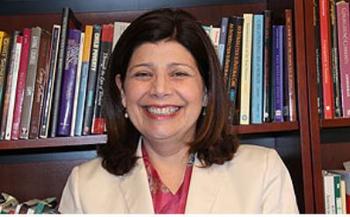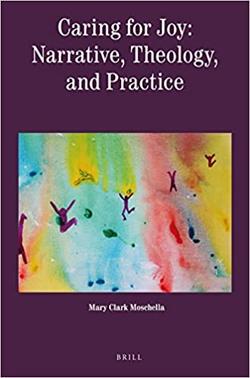By Emily Judd ‘19 M.A.R.
In the new episode of the Yale Divinity School “Quadcast,” Professor Mary Clark Moschella talks about the importance of finding joy during a time of suffering, providing practical tips that may be helpful during a global crisis such as the coronavirus pandemic.

“If we find the things that really interest us and allow us a sense of wonder, we will be more able to lean into joy,” she says in the podcast interview, adding that she sees joy as both an emotion and a gift from God.
***
Listen to the YDS Quadcast interview with Mary Moschella
***
Moschella says it’s important for people to take time to reflect on the blessings in their lives. This practice, she says, cultivates joy.
“Some days it may be hard to find two things you are grateful for. But when people take the time to think about what they are grateful for, there is a change in orientation,” she says.
 Moschella’s practical tips to help keep on the spiritual path of joy include getting a decent night’s sleep, exercising, focusing on nutrition, reducing stress, and embracing moments of goodness when they come.
Moschella’s practical tips to help keep on the spiritual path of joy include getting a decent night’s sleep, exercising, focusing on nutrition, reducing stress, and embracing moments of goodness when they come.
During an international health crisis—a time of anxiety and stress for many—it is easy to feel despair. The coronavirus outbreak is producing a range of emotions that negatively impact mental wellbeing, including fear of infection, disappointment about cancelled travel and events, and feelings of worthlessness for those who cannot continue their work.
There is also the brain’s “negativity bias” working against the feeling of joy—what psychologists say is the tendency among people to give more weight to negative experiences than positive.
Moschella cites research showing that difficult moments make a more indelible imprint on our minds. Yet, she says there are ways to overcome this negativity bias.
“If we learn to pay attention to the good things that may seem small—for example having a friend who you love and who loves you—that’s not a small thing. That’s a big thing. So take a moment to remember that,” she says.
Moschella, a pastor in United Church of Christ congregations in Massachusetts for 13 years, also says it’s important for religious leaders to recognize their gifts and the world’s needs, and to see where the two intersect.
“Though we will not necessarily fix all the great problems of the world, we can be part of changing things we think are wrong and contribute something along the way,” she says.
The complete set of Quadcast episodes can be found here.